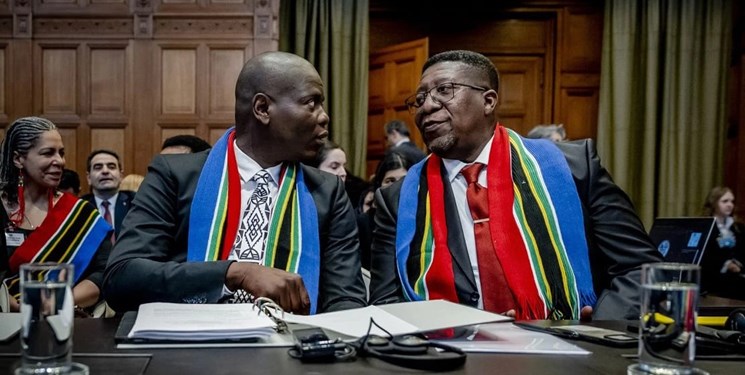In an interview with the website of the Strategic Council of Foreign Relations, Jafar Qanadbashi said: “The government of South Africa got involved in this matter following the public demonstrations of the people who urged the government to take action on the crimes of the Zionist regime. After the parliament’s greenlight and the severance of relations with the Zionist regime, the government prepared a petition to present a fully documented and substantiated report to the court.
He added: “All the presented documents are taken from various UN institutions, and they have tried to include what happened in Gaza in this case impartially.”
According to Qanadbashi, initially, doubts were raised by the supporters of the Zionist regime that this complaint might not be completed. Still, the upright and legal move of South Africa and the support of some other countries caused the court’s jurisdiction to be emphasized and the formation of the court to provide conditions for South Africa to file a complaint. It was also a necessary opportunity for the Zionist regime to defend itself in this court.
Pointing to the importance of the court’s ruling and that it may take several years to issue a verdict ruling according to the Hague court procedure, this expert emphasized: “This is why South Africa has requested temporary measures against Israel; because the lives of the people of Gaza are in danger. “This issue has been approved, and the temporary measures will probably be issued earlier than the general court order.”
Regarding the classification of countries in this lawsuit, he said: “In this scene, many countries have adopted a conservative approach and have not publicly supported any side. Even America, England, and France, who have helped the Zionist regime in the political and military arena, have remained silent, and the countries of the Middle East also reacted with a conservative approach.
About the reasons for this conservative approach of certain countries, Qandabashi said: “One reason may be concern about the costs of any kind of partiality, and another reason is that their support does not play a role in the decision-making process.”
He added: “What is obvious is that in the propaganda field, they have tried to describe South Africa’s actions as fruitless, but legal experts believe that, contrary to popular belief, this court is very serious and its process is based on sound principles, and the course of the court is based on evidence. Which South Africa has presented, and considering the weak defense of the Zionist regime, it will probably end up in condemnation of the Zionist regime.”
The expert on African issues emphasized that if the Zionist regime is convicted of genocide at The Hague, many measures can be foreseen in the Security Council, and sanctions will probably be imposed against Tel Aviv. In the next stage, the court can lead to the formation of a second court, which may lead to the conviction of the Israeli officials.
Qanadbashi continued: “Most legal and political experts believe that if the court gives a contrary verdict, the existence of the United Nations and the International Court will be questioned; Therefore, the supporters of the Zionist regime cannot do much against it in the event of a court ruling against this regime, because the documents that South Africa has presented to the International Court of Justice are very well-founded.”
Pointing out that this court also voted against the Zionist regime in the case of the barrier wall in the West Bank, but they defied it and built the wall, he explained: “Today, without doubt, the Zionist regime will not pay attention to The Hague ruling in its condemnation, but the problem here is that if the genocide is proven, the countries that are friendly to the Zionist regime will not be able to have political and economic relations with Tel Aviv easily, and the ground will be laid for the application of international sanctions more than in the past. At the same time, in such a situation, the US cannot easily veto Security Council resolutions.”
Finally, he pointed out that today, the credibility of the United Nations and its other organs has been questioned and said: “But this court became a tribune for the positions of the opponents of the Zionist regime to be explained and the lies of this regime to be exposed.”










0 Comments